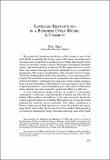Artículo
Leverage restrictions in a business cycle model: a comment
Fecha
2014Resumen
The paper by Christiano and Ikeda in this volume is one of the first efforts to quantify the welfare gains of leverage constraints in a macroeconomic model with a banking sector. Unlike other models their answer is that they can be even more desirable when banks hold little equity and intermediation is depressed. The paper stresses a static force that makes leverage constraints desirable from a second best perspective. This static consideration is the outcome of two frictions: The first is hidden effort on the side of bankers when choosing projects to fund. The second is the presence of incomplete contracts (in the form of limited liability) which prevents depositors from setting contracts that eliminate the hidden effort problem. As a consequence of the lack of optimal contracts times when banks have little equity will be times when optimal contracts cannot be signed and effort is inefficient.
Colecciones
Descargar


